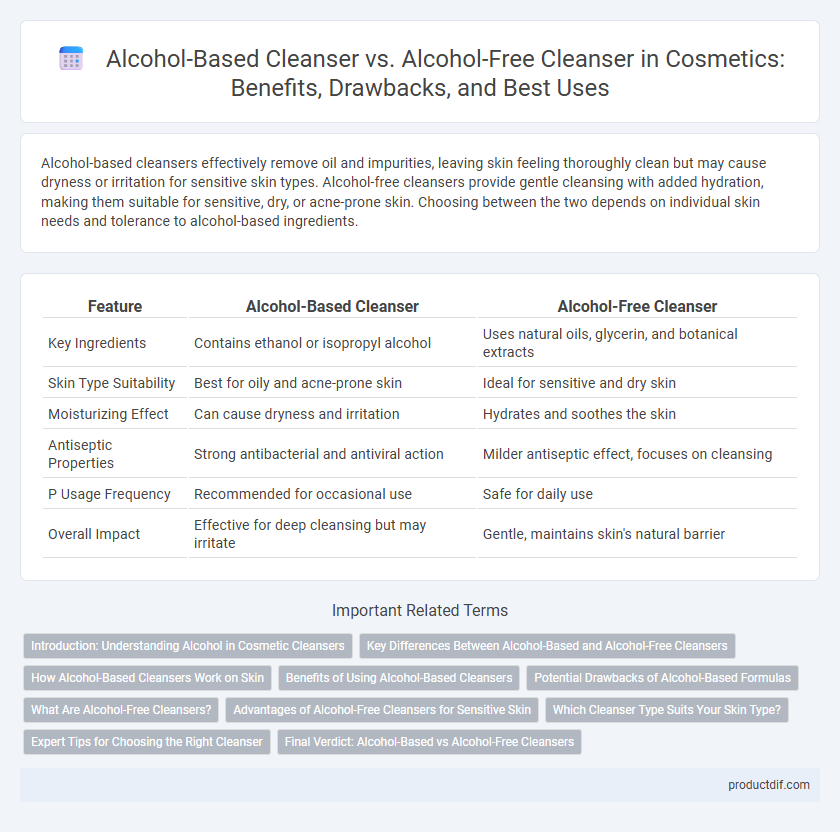Alcohol-based cleansers effectively remove oil and impurities, leaving skin feeling thoroughly clean but may cause dryness or irritation for sensitive skin types. Alcohol-free cleansers provide gentle cleansing with added hydration, making them suitable for sensitive, dry, or acne-prone skin. Choosing between the two depends on individual skin needs and tolerance to alcohol-based ingredients.
Table of Comparison
| Feature | Alcohol-Based Cleanser | Alcohol-Free Cleanser |
|---|---|---|
| Key Ingredients | Contains ethanol or isopropyl alcohol | Uses natural oils, glycerin, and botanical extracts |
| Skin Type Suitability | Best for oily and acne-prone skin | Ideal for sensitive and dry skin |
| Moisturizing Effect | Can cause dryness and irritation | Hydrates and soothes the skin |
| Antiseptic Properties | Strong antibacterial and antiviral action | Milder antiseptic effect, focuses on cleansing |
| P Usage Frequency | Recommended for occasional use | Safe for daily use |
| Overall Impact | Effective for deep cleansing but may irritate | Gentle, maintains skin's natural barrier |
Introduction: Understanding Alcohol in Cosmetic Cleansers
Alcohol-based cleansers contain ingredients like ethanol or isopropyl alcohol that effectively remove oil, dirt, and bacteria, making them popular for oily and acne-prone skin. Alcohol-free cleansers use alternative agents such as glycerin, aloe vera, or hyaluronic acid to gently cleanse while maintaining skin hydration and barrier protection. Understanding the role of alcohol in cosmetic cleansers helps consumers choose products that balance cleansing power with skin sensitivity and moisture retention.
Key Differences Between Alcohol-Based and Alcohol-Free Cleansers
Alcohol-based cleansers contain ethanol or isopropyl alcohol, which effectively remove oils and provide strong antibacterial properties but may cause dryness or irritation for sensitive skin types. Alcohol-free cleansers utilize alternative ingredients like glycerin, hyaluronic acid, or botanical extracts that maintain moisture balance and offer gentle cleansing without stripping natural oils. Choosing between these depends on skin sensitivity, with alcohol-free options preferred for dry or sensitive skin and alcohol-based cleansers suited for oily or acne-prone skin needing deep cleansing.
How Alcohol-Based Cleansers Work on Skin
Alcohol-based cleansers work by rapidly dissolving oils and breaking down dirt, making them highly effective for deep cleaning and removing bacteria from the skin. The alcohol content also acts as an antiseptic, reducing the risk of infection and preventing acne-causing bacteria. However, they can sometimes strip natural oils, potentially leading to dryness or irritation, especially for sensitive skin types.
Benefits of Using Alcohol-Based Cleansers
Alcohol-based cleansers effectively eliminate bacteria and impurities, making them ideal for deep cleansing and reducing acne-causing germs. These cleansers evaporate quickly without leaving residue, ensuring a lightweight feel suitable for oily and combination skin types. Their potent antiseptic properties enhance skin clarity and minimize breakouts, supporting a clearer complexion.
Potential Drawbacks of Alcohol-Based Formulas
Alcohol-based cleansers can cause skin dryness and irritation, especially for sensitive or dry skin types, due to their high concentration of alcohol that strips natural oils. Prolonged use may disrupt the skin's natural barrier, leading to increased redness and sensitivity. In contrast, alcohol-free cleansers maintain hydration and support skin barrier health, reducing the risk of adverse reactions.
What Are Alcohol-Free Cleansers?
Alcohol-free cleansers are skincare products formulated without ethyl or isopropyl alcohol, making them ideal for sensitive or dry skin types prone to irritation. These cleansers often contain moisturizing ingredients like glycerin, aloe vera, and hyaluronic acid that help maintain the skin's natural barrier and hydration levels. Opting for an alcohol-free cleanser supports gentle cleansing without stripping essential oils, promoting healthier and more balanced skin.
Advantages of Alcohol-Free Cleansers for Sensitive Skin
Alcohol-free cleansers are ideal for sensitive skin due to their gentle formulation that minimizes irritation and dryness often caused by alcohol-based products. These cleansers help maintain the skin's natural moisture barrier, reducing redness and inflammation while providing effective cleansing. Using alcohol-free options supports healthier, hydrated skin, making them preferred for individuals with conditions such as eczema or rosacea.
Which Cleanser Type Suits Your Skin Type?
Alcohol-based cleansers effectively remove oil and impurities, making them ideal for oily or acne-prone skin but may cause dryness or irritation for sensitive skin. Alcohol-free cleansers provide gentle hydration and maintain the skin's natural moisture barrier, suitable for dry, sensitive, or combination skin types. Choosing the right cleanser depends on your skin's tolerance to alcohol and specific hydration needs for optimal skin health.
Expert Tips for Choosing the Right Cleanser
Choose an alcohol-based cleanser for oily or acne-prone skin due to its effective oil control and antibacterial properties, as recommended by dermatologists. For sensitive or dry skin, opt for alcohol-free cleansers that maintain skin hydration and reduce irritation risks. Experts emphasize assessing your skin type and concerns to select a cleanser that balances cleansing power with gentleness.
Final Verdict: Alcohol-Based vs Alcohol-Free Cleansers
Alcohol-based cleansers effectively remove oil and bacteria, making them ideal for oily and acne-prone skin, but may cause dryness or irritation in sensitive skin types. Alcohol-free cleansers maintain skin hydration and barrier integrity, suitable for dry or sensitive skin, while still providing gentle cleansing. Choosing between these options depends on individual skin needs, balancing cleansing efficacy with skin health preservation.
Alcohol-Based Cleanser vs Alcohol-Free Cleanser Infographic

 productdif.com
productdif.com